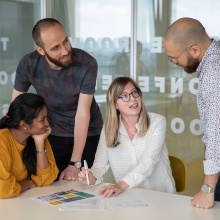Undertaking a Ph.D. journey was a profound and transformative experience for me as a researcher. It was not just about my individual academic pursuits but also about nurturing the next generation of scholars. One significant facet of this process was the supervision of student research projects, bachelor theses, and master theses. As a Ph.D. candidate at the University of Stuttgart, I had the privilege of supervising a diverse group of students, both international and local, in their research endeavors. In this article, I will share my experiences, highlighting the advantages, disadvantages, and challenges encountered during these supervisory roles.
Before delving into the specifics, it is essential to understand the role of a Ph.D. supervisor. The supervisor served as a guide, mentor, and critical facilitator in my students' academic journeys. This role extended beyond just overseeing the research project; it involved fostering intellectual growth, providing emotional support, and preparing students for the challenges of the academic and professional world.
Diversity was a significant advantage
One of the most enriching aspects of supervising research projects was working with international students. These students brought diverse perspectives, methodologies, and ideas to the table. This diversity was a significant advantage, as it promoted cross-cultural understanding and enriched the research process. International students often introduced unique approaches to problem-solving, which led to innovative solutions. The exchange of ideas and experiences between international students and local students was invaluable. It fostered a global academic environment where cultural barriers were broken down, and a more holistic approach to research was encouraged.
There were many positive experiences during the supervision process. I found supervising research theses profoundly intellectually stimulating. It exposed me to fresh ideas and novel approaches, often challenging my own perspectives and enhancing my intellectual growth. Supervision fostered collaboration, allowing me to work closely with other researchers. This collaborative aspect encouraged the exchange of ideas, methods, and feedback, ultimately enriching the research process. Being a thesis supervisor provided me with valuable mentorship experience. It allowed me to hone my teaching and mentoring skills, which I found highly transferable to my future academic or industry roles.
Supervising research theses enabled me to expand my academic network. I interacted with fellow researchers, faculty members, and students, potentially opening doors to new opportunities, collaborations, and research projects. The supervisory role encouraged my professional growth. It demanded strong organizational, communication, and leadership skills, which I found beneficial in various career paths, not limited to academia.
Supervision exposed me to different fields of study. Interdisciplinary collaboration led to novel insights and approaches, broadening my horizons and enhancing my research capabilities.
Juggling responsibilities
On the contrary, supervising is a demanding task. Supervision was time-consuming and energy-draining. It often required a delicate balance between my personal research, administrative duties, and mentoring. Juggling these responsibilities could lead to burnout if not managed efficiently. I often found it challenging to balance my dual roles as a student and supervisor. I had to avoid blurring the lines between being a peer and an authority figure. Effective communication was crucial but could be hindered by differences in expectations, goals, and communication styles. Bridging these gaps required patience and skill. Some students required more guidance than others. Tailoring mentorship to individual needs was demanding, and striking the right balance between hands-on support and autonomy was a continuous challenge. Ethical issues could arise, especially when dealing with plagiarism, data fabrication, or other research misconduct. Addressing these dilemmas required a delicate approach to maintain academic integrity.
Regardless of the students' backgrounds, several common challenges arose in the supervisory role during my Ph.D. journey. Balancing research, personal life, and student supervision was demanding, and it required effective time management skills. Clear and effective communication was paramount. Ensuring that students understood expectations and feedback was crucial. Maintaining students' motivation and preventing burnout was challenging, as research projects often came with their own set of frustrations and setbacks. Every student was unique. Understanding and catering to their individual needs and learning styles was vital for successful supervision.
A chance for personal and professional growth
As a whole, supervising student research projects, bachelor theses, and master theses during my Ph.D. journey was a multifaceted and rewarding experience. Working with both international and local students presented unique advantages, disadvantages, and challenges. Ultimately, effective supervision required adaptability, open communication, and a keen understanding of the individual needs of students. It was not only an opportunity to contribute to the academic growth of the next generation but also a chance for personal and professional growth for me as a researcher. The role of a Ph.D. supervisor was more than just overseeing research; it was about shaping the future of academia and fostering a global community of scholars.
In conclusion, supervising research theses as a Ph.D. candidate offered me numerous advantages, such as intellectual stimulation, collaboration, mentorship experience, networking opportunities, professional growth, and cross-disciplinary insights. However, it also presented a set of challenges, including time and energy demands, role balancing, communication hurdles, mentorship complexities, ethical dilemmas, and potential personality conflicts. Navigating these advantages and challenges was an essential part of my journey towards becoming a successful researcher and mentor.
Abdul
Comment on this article
Your email address will not be published.




